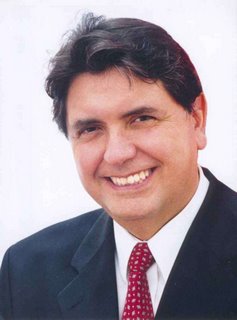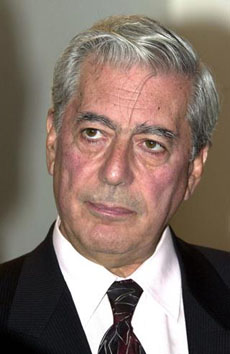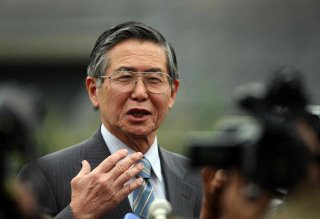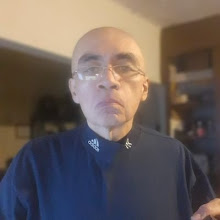
The latest polls showed García as the frontrunner in a heavily contested election that has been deeply affected by Venezuelan interventionism and, strangely enough, by the ability of García to gather unexpected expressions of support from those who, few years ago, were his fiercest critics.
Public figures like Mario Vargas Llosa, who lost in a similar runoff to Alberto Fujimori back in 1990, and many others have expressed, one way or the other, their support for former President García.
The fact that they are doing so is not so much an expression of belief in García’s proposals or because of “happy memories” associated with his presidential term. Quite the opposite. They express one of Peru's most dramatic and painful paradoxes.
To stress the very nature of the paradox, it is interesting to hear Hugo Chávez throwing at García similar darts to those thrown at García by Vargas Llosa and other figures of the Peruvian national scene back in the 1980s.
Chávez's bitter depiction of García as “a thief” and responsible of one of the worst crisis in Peruvian (and Latin American) history is, for the most part, accurate. It reminds me of the kind of things that people said of García at the end of the 1980s, when Mr García left an exhausted Peruvian economy, and a country at the brink of civil war.
At that time, I was a junior editor in the International Desk at Mexico City’s Excélsior, then the largest newspaper in Mexico, and I read with a sense of both awe and pain the reports of both Excélsior’s correspondent, the envoys, and the wires from the Associated Press, EFE, Xinhua, and France Press.
Not only that, I was a subscriber of the Mexican literary and critical magazine Vuelta, whose director was no other than Octavio Paz, a close friend of Vargas Llosa and my pundit, at a time in which, because of my age, my personal views on the region were developing.
Also, a few years later, I was lucky enough to have in one of my courses a student of mine a beautiful and very inteligent Peruvian student, Vanessa, who gave detailed depictions of what it was for her, as a teenager, to grow up in a country thorn by Civil War, hyperinflation, and the (mis)deeds orf irresponsible politicians as Mr García.
I was hoping for a victory of Vargas Llosa. He was unable to win, and instead Fujimori-san took over as President launching very aggressive policies to curb inflation, as at some point at the end of the García era, it was spiraling beyond the 3000 percent mark yearly, something only surpassed by the even worse situation in Brazil and Argentina. (For an analysis of those years in Latin America click here).
Fujimori led a bloodless auto-coup d’Etat, mercilessly killed guerrilla partisans, forced the resignation of the country’s Supreme Court and Congress, and, more importantly, was able to bring some sense of order to the Peruvian markets, going through a painful renegotiation of the debt with the International Monetary Fund, the World Bank, and the Inter-American Development Bank.
Peru’s renegotiation was harder than others in Latin America, because by the end of his term, Mr García decided to withhold the payments of his country’s debt while launching a desperate diplomatic blitz to gather support from other Latin American countries.
García, did so with many of the gimmicks that Chávez does nowadays. I remember a picture of him with a Mariachi hat in the very famous Garibaldi square in Mexico City, singing with a large crowd of Mariachis, his own entourage, and innocent bystanders, after seeeking to secure the support of the Mexican government.
However, as with Chávez, the gimmicks achieve little or no success outside of their countries, although, unlike Chávez, García was a “pobre Presidente de un país más pobre” (a poor President from an even poorer country), so any appeal was made on the grounds of solidarity and the Boliviarian rhetoric that is always used in these kinds of situations. Chávez, on the other hand, has oil and the supp ort of the efficient Cuban Foreign Office to pursue his agenda.
ort of the efficient Cuban Foreign Office to pursue his agenda.
Interestingly enough, the Peruvian citizens, as it is often the case in Latin America, dug their own grave. When confronted with the proposals made by Vargas Llosa (a “shock” plan to bring the economy back in line with an aggressive negotiation with the multinational financial institutions), Peruvians decided to elect Fujimori-san.
Unlike Vargas Llosa the writer, Fujimori-san, the populist outsider, then a bureacrat in one empoverished public college, with little or no political experience, presented himseld as unwilling to perform the “shock” plan that years before Chile and Mexico had performed. Instead, he offered a guilt-free and pain-free solution to the Peruvian crisis…
Of course, he was lying. Fujimori-san, the Peruvian samurai, applied a “shock” plan harder than the one originally proposed by Vargas Llosa and, at least when dealing with the economy and the Shining Path guerrilla, he was very successful. Vargas Llosa went back to writing and eventually became a citizen of Spain, disconnecting himself from the tensions and erosion of partisan Peruvian politics.
As it is possible to see, there are no real reasons to think that Mr García will be the best possible choice for Peru. Moreover, unlike Ollanta Humala, García has been “vetoed” by Chávez, the self-appointed oil em peror of Latin America, unless… No reasons unless one considers Ollanta Humala’s propositions, marred by the same rhetoric and ideas that one finds in Evo Morales's and Hugo Chávez's speeches.
peror of Latin America, unless… No reasons unless one considers Ollanta Humala’s propositions, marred by the same rhetoric and ideas that one finds in Evo Morales's and Hugo Chávez's speeches.
The Peruvian electorate is, to my mind as immature as it was back in 1990 when they chose Fujimori over Vargas Llosa, and that expresses itself in the outcome of the first round of the Presidential election, as much as it expresses on many of the attitudes that distinguish Peruvian political debate. The Peruvian section at Blogalaxia provides a good sample of the kind of excesses that bloggers from that country do when arguing about politics, with more passion for personal insults and attacks and the ever present racial remarks that have marred Peru since its very origins, than with any sense of the kinds of pressures that Peru is confronting.
They are, as in many other Latin American countries, trapped in a "victim centered" discourse of their own misfortunes, unwilling to acknowledge how they have contributed, over time, to build one of the worse case scenarios of what, accurately enough, Chilean sociologist Manuel Antonio Garretón identifies as "regressions from democratic to authoritarian regimes." The other regressions in Garretón's framework are, interestingly enough, Ecuador. Bolivia, and Venezuela.
PS: I thank David McDuff, authior of One Step at a Time, for encouraging me to update this blog again. I will do my best to do it so more frecuently.
Technorati Tags: América Latina, Latin America, Perú, Alan García, Ollanta Humala, Mario Vargas Llosa, Manuel Antonio Garretón, Alberto Fujimori, Rodolfo Soriano, Social Change in Latin America

No comments:
Post a Comment